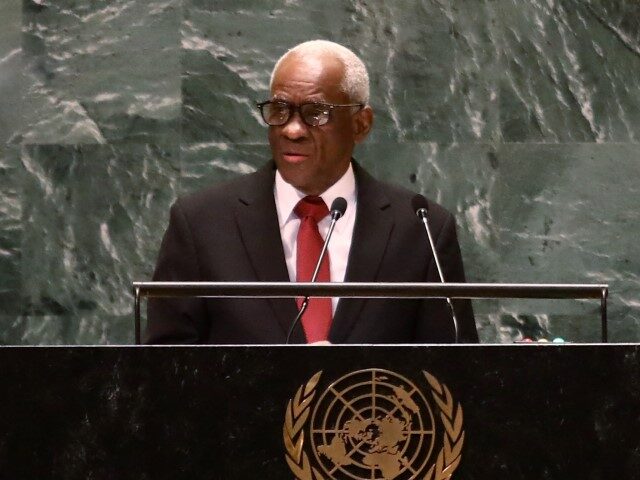The head of Haiti’s “Transitional Presidential Council” Edgard Leblanc Fils demanded “historical reparations” for his country at the United Nations General Assembly on Thursday, asserting that the international community has an “essential role” in Haiti’s recovery.
The Transitional Presidential Council, which Leblanc presides over, was formed at the end of April following a prolonged period of political negotiations to serve as the nation’s working government after months of gang violence left the country on the brink of total collapse. Haiti has not had a president since the assassination of President Jovenel Moïse in July 2021.
In his speech to the U.N., Leblanc extended a salute to all Haitian migrants around the world, assuring them that, wherever they are, the council he leads is “thinking of them until the conditions are right for them to return to the fold.”
Speaking on behalf of the Haitian people, Leblanc also extended “fraternal greetings to all the friends of Haiti” that have shown solidarity with its migrants, making special mention of Springfield, Ohio.
“The long history of friendship and mutual solidarity between our two nations, since our participation in the Battle of Savannah in 1779, allows us to say with confidence that the American people reject any incitement to hatred against our community,” Leblanc said. “The active participation of Haitian immigrants at various levels of American life is tangible and significant.”
“In this respect, the passions that naturally emerge during an election campaign should never be used as a pretext for xenophobia or racism in a country like the United States, a nation forged by immigrants of all origins and which has set itself up as a model of democracy on a global scale,” he continued.
Leblanc stressed that solving Haiti’s problems “rests first and foremost on the shoulders of the Haitian people,” but that the responsibility does not lie with them alone. Leblanc declared the international community, the United Nations, and the “foreign powers that often played a decisive role in Haiti’s history” responsible for an “essential part” of the efforts towards restoring peace and the rule of law in the country.
“In this sense, Haiti’s failure to recover is not just that of a nation. It reflects a collective failure, a global inability to fully respect the principles of solidarity, justice and international cooperation,” Leblanc said. “Together, with shared responsibility and renewed commitment, we can transform this crisis into an opportunity, and chart a lasting course towards peace.”
The head of the transitional council described Haiti as the “great victim of a historical injustice that has … delayed its development,” accusing France of holding its freedom ransom in 1825. Lebland added that Haiti’s colonial past “largely mortgaged its development.”
“On the eve of the bicentenary of this unprecedented event in the history of the world, has the time not come for the restitution of these sums?” Leblanc asked the U.N.
The Haitian transitional council leader affirmed that Haiti has confidence in the United Nations’ role to set up dialogue mechanisms to facilitate talks between “countries that were victims of colonization and the former colonial powers.”
“Here, at this 79th session of the General Assembly, Haiti is, through me, not simply demanding reparation, but raising a question of principle, that of imminent justice,” he asserted.
On the subject of the out-of-control gang violence in Haiti, Leblanc assured his listeners that restoring national security is an absolute priority of the nation’s authorities, who are “fully committed” to ending the spiral of violence and restoring order to the country. Leblanc also expressed support of a U.N. peacekeeping mission to fight gang violence in the country proposed by the United States and Ecuador this month.
“They are aware that peace and stability are the indispensable foundations for Haiti’s recovery, for the restoration of confidence in institutions, and for the socio-economic development of its people,” he said.
Christian K. Caruzo is a Venezuelan writer and documents life under socialism. You can follow him on Twitter here.

COMMENTS
Please let us know if you're having issues with commenting.